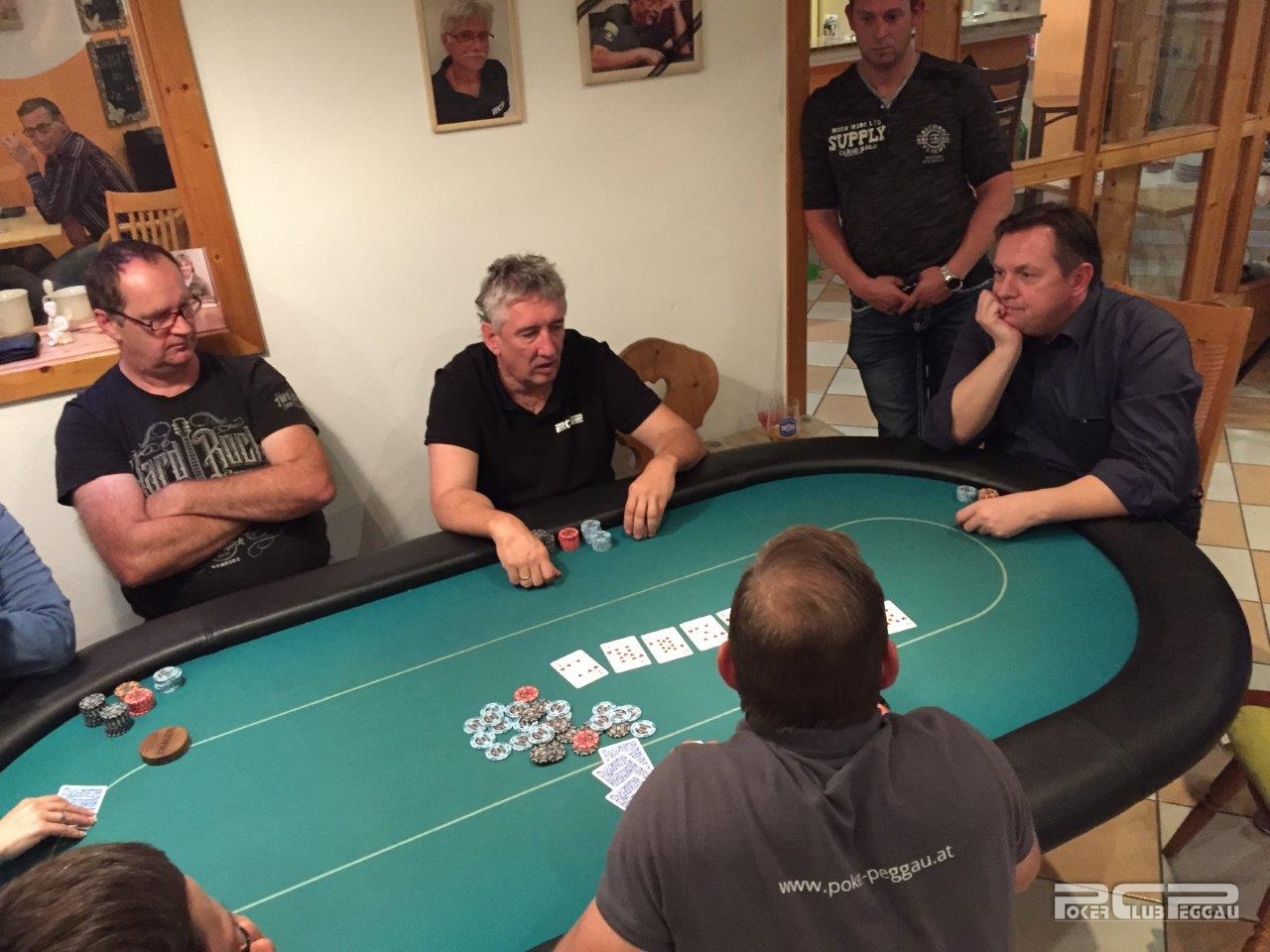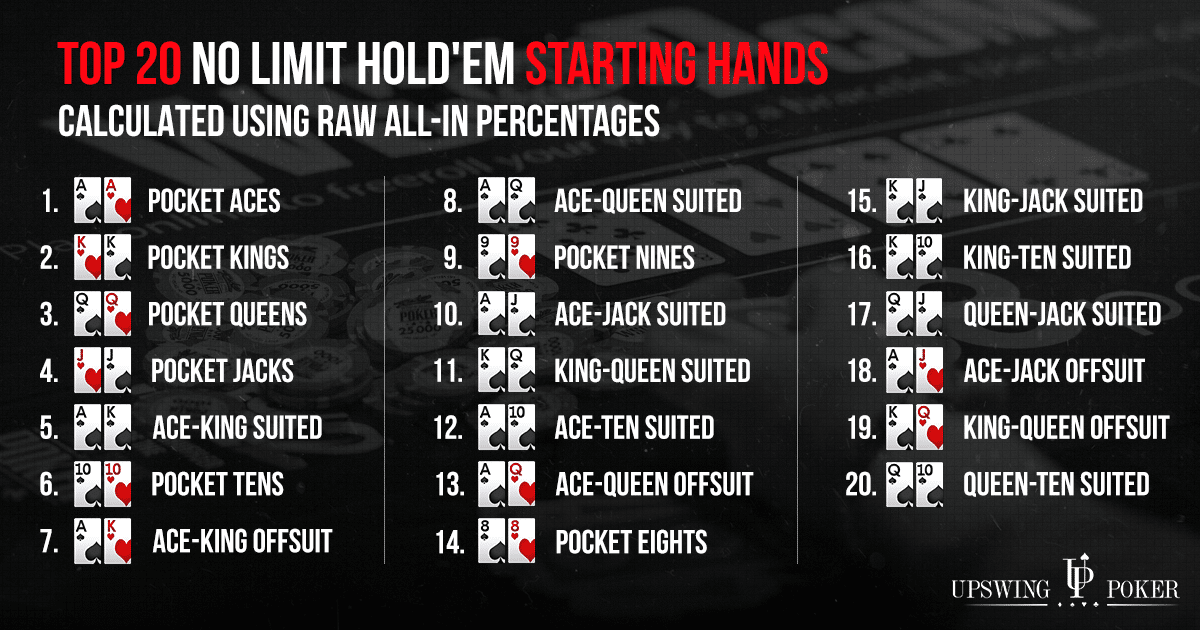As in regular hold'em, in short-deck poker the aces still count as high or low when making straights. The lowest possible straight in a game of short-deck poker is A x 9 x 8 x 7 x 6 x (think of the. $1/$2 No-limit Texas Hold'em is by far the most popular poker game being played in live poker rooms around the country. For the average poker player $1/$2 cash games are the bread-and-butter of their weekly poker fix. For someone who's up to speed on the basics of good cash-game strategy, it's also the main source of their poker profit. NL Hold’em Starting Hand Charts One aspect of the game of No-Limit Hold’em that causes beginning players much grief is deciding which hands to play and which hands to dump. NL Hold’em is much more difficult than Limit Hold’em. The main drawbacks is the game can only be played with six players because there are only 20 cards in the deck: four 10’s, four jacks, four queens, four kings and four aces. The hand rank is the same as Hold’em, and the flop/river/turn concept is the same as well.
Occasionally, someone will ask me if Poker and Texas Hold’em are the same thing. I’ve been a professional poker player for years and am happy to explain the differences between various card games.
What is the difference between Poker and Texas Hold’em? Poker and Texas Hold’em are not the same thing. Texas Hold’em is a community card game, one of the thre variations of poker. Other variants include Stud and Draw Poker. All poker games are played by two or more players who compete to try and make the best hand by using a defined hand ranking system.
Now that you know how Texas Hold’em is just one of many poker games, let’s discuss a few of its variations. Think of this as a crash course on everything poker.
The Variations of Poker
There are three main types of poker variants:
- Community Card Games
- Draw Poker Games
- Stud Poker Games
While growing up, I learned to play draw and stud poker. In fact, anyone over the age of 40 probably did so as well. However, community card games are by far the most popular poker games today.
While there are key differences between each poker variation, there are also numerous commonalities.
What All Poker Games Have in Common
Each game within a variant will almost always have the same basic rules. All poker variations have:
- An “Ante” (Pronounced An-Tee) which is the minimum amount of money that each player much wager to play in the game. These are forced bets before the game begins. In some games, every player pays the same ante while in other games only a set number of players pay the ante or “blind.”
- Betting rounds where players can bet, check, call, or raise.
- The same hand ranking system including high card, pairs, two-pairs, trips, straights, flushes, full-houses, four-of-a-kind, straight flushes, and the extremely rare royal flush.
- Competition with at least two players being needed to play. There is no solo poker.
While the hand rankings tend to be the same, the way the game plays can vary wildly from one variant to another. Here are the three common variations with examples of popular games.
1. Community Card Poker Games
In a community card poker game, every player is
Common Community Card Poker Games
- Texas Hold’em – Each player is dealt two hole cards and then there is a “pre-flop” betting round following a defined order of play. Three community cards, called the “flop, are then dealt and there is a 2nd betting round. After the flop,
comes the turn where a single community card is dealt followed by the third betting round. Finally, the last community card called the “river” is dealt and the fourth and final betting round occurs. If action is closed on the river, then the players with hole cards still in play “showdown” their hands in a defined order and determine the winner. - Omaha – Omaha plays exactly like Hold’em except that each player receives 4 hole cards and exactly two of those hole cards must be used to determine his or her best 5-card hand. For example, if there are 4 Hearts on the board, a player must still have two hearts in their hand in order to make a flush.
- Pineapple – Pineapple is a game with many variations. Each player is dealt three hole cards, one of which can be discarded at a particular point in the hand, depending on the variation. Most commonly, the discard happens pre-flop. No matter on what street the discard occurs, the hand otherwise plays just like Texas Hold’em.
- Courchevel – This game plays just like Omaha except that each player gets five hole cards and one of the flop cards is dealt before the first betting round occurs.
2. Draw Poker Games
In draw poker games the players do not share any cards but are rather are dealt a complete hand before the first betting round. Typically, each player is allowed to trade in and “draw” between one and four cards new cards from the deck. There is now another betting round based on the new hands and showdown occurs.

Common Draw Poker Games
Poker Nl Holdem Real Money

Poker Nl Holdem Poker
- Five-Card Draw – In
five-card draw, each player is dealt five cards. Typically, each player can trade is between one and three cards after the initial betting round. However, some local rules allow for four cards to be traded if the player has an Ace. - Seven-Card Draw – Plays exactly like five-card draw, except each player is dealt seven cards at the start of the game.
- Double-Draw – Double-Draw plays exactly like regular draw poker there are two draw phases instead of just one, which adds an extra betting round to the game. There is also triple-draw poker as well.
3. Stud Poker Games
In stud poker games, the players are dealt a set number of cards. Only the cards initially dealt can be used to play the game. There are no community cards and no cards are drawn. Typically, each player is dealt a set number of down cards and then a defined number of face-up cards. Usually, the last card dealt is again face down.
Common Stud Poker Games
- Seven-Card Stud – Seven-card Stud was the most popular game in the world before Texas Hold’em took that title in the early part of the 21st century. At the start of the game, each player is dealt two cards face down and one card up. After the initial deal, the first betting round occurs. There is then one betting round after each additional card is dealt face up. The final card is dealt face down. There are five betting rounds possible with each player ending up with three cards down and four face-up.
- Razz – Commonly known as “seven card stud low”, Razz is a game where you try to make the lowest hand possible in poker. The wheel is the most powerful hand in Razz followed be 6, 4, 3, 2, A and 6, 5, 4, 3, 2, so on and so forth. Except for the different hand ranking criteria, Razz plays exactly like seven-card-stud.
- Five-Card Stud – This game was most popular in the 18th century and involves each player is dealt one card down and one card face up. The player with the lowest card must pay a “bring in” bet in order to continue in the game. Then, there is a betting round. The player with the best hand showing always goes first. In total, there are four face-up cards with a betting round after the cards are dealt.
- Mississippi Stud – Mississippi stud plays exactly like seven-card stud except that there is no betting round between fourth and fifth streets. Also, the final card is dealt up. This game has the same feel as Texas Hold’em except there are no community cards.
Final Thoughts
So now you know that Texas Hold’em and poker are not the same thing and that Hold’em is just one game in a multitude of poker games. If you are interesting in learning Texas Hold’em strategy, be sure to check out my comprehensive tutorial.
Related Questions
What is

Can you bet after the river in Texas Hold’em? Yes, you can bet after the river card is dealt in Texas Hold’em. There are four betting rounds total: One after the hole cards are dealt, one after the flop is dealt, one after the turn is dealt, and one after the river is dealt.
Is Ace high or low in poker? In most poker games the Ace can be high or low. An Ace can be either the highest card that can make a straight, Ten-Jack-Queen-King-Ace (called broadway) or the lowest card that can make a straight, Ace-Two-Three-Four-Five (called the wheel).